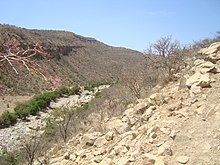Boswellia papyrifera

| Boswellia papyrifera | |
|---|---|
| Scientific classification | |
| Kingdom: | Plantae |
| Clade: | Tracheophytes |
| Clade: | Angiosperms |
| Clade: | Eudicots |
| Clade: | Rosids |
| Order: | Sapindales |
| Family: | Burseraceae |
| Genus: | Boswellia |
| Species: | B. papyrifera
|
| Binomial name | |
| Boswellia papyrifera | |
| Synonyms[1] | |
| |
Boswellia papyrifera, also known as the Sudanese frankincense,[2] is a species of flowering plant and frankincense that is native to Ethiopia, Eritrea and Sudan. The tree is cultivated in Ethiopia because of its valuable resin. The incense is characterized by a fresh lemon-pine scent[3] and is therefore highly esteemed. In Ethiopia where it is called itan zaf,[4] it comes in semi-translucent yellow tears. The gum resin of Boswellia papyrifera coming from Ethiopia, Sudan and eastern Africa is believed to be the main source of frankincense of antiquity.[5]
Chemical constituents
[edit]In studies conducted on the chemical properties of the oleo-gum resin of B. papyrifera, it was shown to contain a high concentration of octyl acetate (57.1–65.7%) and N-octanol (3.4–8.8%), the former accounting for its citric note. The species also contain diterpenes and nortriterpenes; the methanol extracts specifically consisting of the following diterpenes: incensole, incensyl acetate and verticilla-4(20),7,11-triene). It also contained the following triterpenes: β-amyrin, α-amyrin, β-amyrenone, and α-amyrenone. The oleogum resin also contained nortriterpenes (24-noroleana-3,12-diene and 24-norursa-3,12-diene) and α-boswellic acid.[6]
References
[edit]- ^ "Boswellia papyrifera". Germplasm Resources Information Network. Agricultural Research Service, United States Department of Agriculture. Retrieved 24 September 2014.
- ^ Äthiopischer Weihrauch (Ethiopian incense)
- ^ "Ethiopian Oils and Resins". Archived from the original on 2017-02-16. Retrieved 2017-02-16.
- ^ Agroforestry in Ethiopia Archived 2017-02-16 at the Wayback Machine, bottom of p. 3.
- ^ Tucker, Arthur O. (October 1986). "Frankincense and myrrh". Economic Botany. 40 (4): 425–433. doi:10.1007/BF02859654. S2CID 12460227.
- ^ Bekana, D.; Kebede, T.; Assefa, M.; Kassa, H. (2014). "Comparative Phytochemical Analyses of Resins of Boswellia Species (B. papyrifera (Del.) Hochst., B. neglecta S. Moore, and B. rivae Engl.) from Northwestern, Southern, and Southeastern Ethiopia". ISRN Analytical Chemistry. 2014: 1–9. doi:10.1155/2014/374678.
